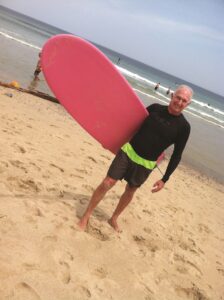“On the beach,” was the term sailors once used to describe being on land rather than at sea. Unlike its meaning in our modern beach-and-sun-crazy culture, the original catchphrase had a pejorative inflection: being left on the beach meant one was earning neither a living nor glory. If you were on the beach, you were nowhere.

To me, the words have little to do with sand. On the Beach is a novel by Nevil Shute. The book, written in 1957, and the two movies made from it, tells the story of a submarine commander who finds himself on the beach in Melbourne, Australia in the aftermath of a nuclear war that has ended all human life in the Northern Hemisphere. The deadly nuclear cloud is slowly and inexorably making its way south and will eventually kill everyone. The book has its adventurous moments, as well as a romantic element, but mostly it is about life and death and how different people handle the inevitable.
I first read the novel in the mid 1960s, when my all-encompassing passions revolved around fishing and surfing. I remember watching Walter Cronkite on the evening news one day with my dad. CBS was showing footage of U.S. Marines landing on a beach in Vietnam. As they stormed ashore through the surf, I recall commenting excitedly to my dad, “Look at those perfectly peeling waves!”
My father’s retort was angry. “What are you thinking? Do you want to end up in Vietnam so you can surf?” It was not long after that exchange that my English teacher assigned us Shute’s book. It changed my life.
The concept of nuclear war was not hard to imagine for a teenager who had spent the Cold War diving beneath school desks when air raid alarms were tested. How could I not wonder what a real nuclear bomb attack would sound and feel like? Shute’s terrifying tale made me aware for the first time how small the world is and how precarious our lives in it are.
Suddenly, the news and politics and the state of our environment became fascinating subjects, frothing with consequences both intended and not. As the world shrank, my sense of place and purpose grew larger. I began learning how to connect the dots to understand the interplay of the world’s great forces, both human and natural.
The beach, where my family had spent its happiest moments, became in the same instant both more important and less so. It would never again be the absolute center of my world. But because it was a place I loved and understood, the beach came to represent what we all stood to lose by our poor decisions and thoughtless actions. It became the place where even today I look to see where we stand in our fight to save the planet from our own version of Shute’s thermonuclear cloud.
I am lucky to have spent so much of my life on Cape Cod’s beaches. The land and sea and air touch each other more closely here than anywhere else I’ve known. Compared to rockbound shores, the Cape’s beaches, with their incessantly shifting dunes, roaring winds, and savage seas, seem pliable, alive in their own right, impermanent.
On the beach here nothing remains the same. From year to year, even from month to month, the changes can be extreme. One day the ocean is as calm and clear as any Caribbean sea. The next day, frothy, clay-colored waves are breaking near the horizon. Giant lengths of 100-foot-tall dunes collapse on a regular and lately far more frequent basis. In spite of worldwide losses, the sea and air remain life-filled, with whales, sharks, seals, gamefish, and all manner of birdlife making daily appearances.
My meteorologist father and I would sometimes drive all the way from Boston to the Cape just to watch Mother Nature’s fury when a hurricane brushed the shore. Like me, he was drawn to the power and the majesty of waves. For my dad, what was compelling was the science behind the storm. But my fascination with the beach was never intellectual. I wanted to ride its waves and stand in the surging shorebreak to hunt its creatures.
In a college ecology class, I was taught that life on Earth began at the confluence of land, air, and sea. Nowhere else on the planet, the theory goes, was there the constant stirring and the requisite energy necessary in the original witches’ brew to generate the spark of life.
It is on the beach that I have come to understand the frailty of our natural world and the fact that nothing lasts forever. Our shorelines, our wildlife, and we ourselves are like the waves that form, crash, and vanish into the sand — once more, no more.



